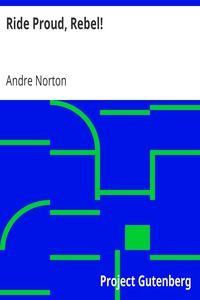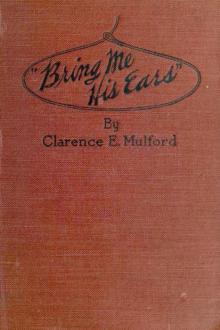Rebel Spurs, Andre Norton [best free ereader TXT] 📗

- Author: Andre Norton
Book online «Rebel Spurs, Andre Norton [best free ereader TXT] 📗». Author Andre Norton
"Why didn't you pull out yourselves?" Anse asked curiously.
"Because, were we watched, that would have made our discovery as plain as if we stood out in the open and shouted it to the winds. For three days before we found that trail we had been building a pen for wild ones, casting about for the tracks and runs of the Pinto's band. Having done so, we would not leave without completing our drive. And, should those out there suspect"—Trinfan shook his head—"we would not have lived to reach the Stronghold, and that is the truth."
"This is also truth, padre." Faquita came to the fire and picked up the coffeepot, pouring the thick black liquid into the waiting line of tin cups. "It is time for us to finish and be on the move—not to just talk of what must be done."
Drew looked up in surprise. The girl was wearing breeches, ready to ride. In addition, instead of the gunbelts which all the men wore as a matter of course, Faquita had tucked a pair of derringers in the front of her sash belt. Their small grips showed above the faded silk folds.
"She goin' with us?" the Kentuckian asked, as the girl kicked dust over the campfire and stowed the empty pot in the cart. "Ain't that dangerous—for her?"
Hilario got to his feet with a lurch that made his crippled state only too plain. "Señor, to hunt the wild ones is dangerous. You see me, twisted like a root, no? Not tall and straight as a man should be. This was done by the wild ones—in one small moment when I was not quick enough. Among us—the[pg 142] mustangers—it is often the daughters who are the best riders. They are quick, eager, riding lighter than their brothers or their fathers. And to some it is a loved life. With Faquita that is true. As for danger—is that not always with us?
"In war danger is a thing which one man makes for another. In this country the land itself fights man—war or no war. A cloudburst fills an arroyo with a flood without warning, and a man is drowned amidst desert sand where only hours before he could have died for lack of that same water. There is a fall of rocks, a fall of horse, a stampede of cattle, sickness which strikes at a lone traveler out of nowhere. Yet have you not ridden to war, and come now to live on this land? Sí, we have danger—but a man can also die in his bed in the midst of a village with strong walls. And to everyone his own way of life. Now we ride...."
They did indeed ride, following a trail which, as far as Drew could see, existed only in the minds of the mustangers. But the three Mexicans swung along so confidently that he and Anse joined without question or argument.
At a distance they circled the waiting pen with walls of entwined brush and sapling, ready to funnel driven horses into a blind canyon. The Pinto's band must be located, somehow shaken out of the rocky territory their wily leader favored, before that drive could begin. Water, Trinfan said, would be the key. Horses must drink and they were creatures of habit, never ranging far from some one hole they had made their own. Trinfan blankets already flapped about the Pinto's chosen spring. They had seen the horses approach several times in the past two days and shy away from those flapping things with the fearsome man scent.[pg 143]
"As long as La Bruja is with them," Faquita said, coming up beside Drew, "they will not come."
"La Bruja?"
"The Witch, as Anglos would say. We call her so because of her cunning. She is the wise one who keeps lookout. I say she is possessed by the Evil One. It is possible the Pinto is her son. Together they have always outwitted the hunters. But La Bruja is old—she runs more stiffly. Last time in the chase she began to drop behind. She is of no use, only a nuisance. It is the White One I wish to drop rope over!"
"The White One?"
"Sí. She is Nieve—the snow of the upper mountains. Among our people you will hear many tales of white ones, without a dark spot on them—the Ghost Stallions that run the plains and no man may lay rope over. But this mare is the truth! And someday—" Her eyes shone and she seemed to be making some vow Drew would be called to bear witness to. "Someday she will be mine! Not to trail south and sell—no—but to keep, always!"
"She must be very beautiful," he commented.
"It is not only that, señor. You have a fine horse, one which beat Don Cazar's Oro, is that not so?"
"Yes. Shiloh ..."
"And to you that one is above all other horses. If you lost him, you would be—like hungry ... inside you, is that not also so?"
"Yes!" Her earnestness triggered that instant response from him.
"So it is with me since I have seen Nieve. Men find such a horse; for years they follow the band in which it runs to snare it. They will suffer broken bones, as did my father,[pg 144] and hunger, and thirst, because there is one tossing head, one set of flying heels before them. Sometimes they are lucky and they catch that one. If they do not, there is in them a pinch of winter even when the desert sun is hot. Once I loved all horses—now there is this one which I must have!"
"I hope you get her!"
"Señor, last season I hoped. This season—this season I have belief that my hopes will come true. Ah, look, the Indio!"
She pointed with quirt and Drew glanced left. He saw what appeared to be an outcrop of rock among many others move, then rise on sturdy legs to meet them.
Running Fox, a brown blanket twisted over one shoulder, the rest of him stripped down to breechclout and moccasins, padded up to Hilario Trinfan and spoke in the guttural Pima. The mustanger translated.
"The horses are still there. But there is a camp of two men on the north slope above the canyon. Both men are Anglos. They are armed with rifles and take turns watching."
"Can we reach a place from where we can read the brands on the horses?" Drew asked.
Trinfan questioned the Pima.
"Sí. But you can not go there by day. You must go in at dusk, wait out the night, and then see what you could in the early morning. Leave before sunup. Otherwise the watchers may be able to locate you. He says"—Trinfan smiled—"that he could go at high noon and would not be seen. But for a white man is a different matter."
"Waste a whole day jus' waitin'!" Anse protested.
"Señor, when one balances time against death, then I[pg 145] would say time is the better choice," Hilario replied. "But this day will not be wasted. If any watch us—as well as those horses—they will see us about our business and will have no doubt that we hunt wild horses, not stolen ones."
So Drew and Anse joined the mustangers' hunting. To Anse this was something he had done before. Drew remembered that the Texan had been working with just such a hunting party when his family had been wiped out by the Comanches in '59. But to Drew it was a new experience and he was deeply intrigued by what he saw and the reasons for such action.
All they sighted of the Pinto's now thoroughly thirsty band was the stud himself and a black mare—La Bruja—looking down from a vantage point high on a rocky rim. And the hunters did not try to reach them, knowing that all the wild ones would be long gone before they could reach that lookout.
"This is the fourth day." Hilario Trinfan sat his buckskin at the water hole, watched Teodoro make careful adjustment of the blankets tied on the bushes. "They will be wild with thirst. Tomorrow the blankets will be taken down. There will be no sign of man here. By mid-afternoon the mares will be ready to fight past the Pinto for water. He can not hold them away. So, they will come and drink—too much. Perhaps he will come, too. If he does"—Trinfan snapped his fingers—"I shall be waiting with a rifle. We take no more chances with that one! Anyway, the mares will be heavy and slow with all the water in their bellies. They can be herded into our trap. Then he will come, sí, that one will come—no one can take his mares from him! He will be mad with rage, too angry to be any longer so[pg 146] cunning. We shall have him then. And there will be no more killings of studs here."
At dusk Running Fox slipped down to the camp, but not far enough into the circle of firelight to be sighted by any watcher in the night. Then with Drew and Anse he was off again.
Within less than a quarter-hour Drew could have laughed wryly at his past satisfaction in his prowess as a scout. Compared to this flitting shadow he was a bush bull crashing through the brush. Anse was better, much better, but even he was far below the standard set by the Pima. The trio climbed, crept, crouched for long moments waiting for Drew knew not what—some sound, some scent, some sight in the night which Running Fox would accept as assurance of temporary safety.
The Kentuckian had no idea of how long it took them to reach the perch into which they at last pushed. A breastwork of rock was before him; the half circle of a shallow cave cut off a portion of the star-pointed sky above. "Stay—here." The two words were grunted at them out of the dark. Then nothing ... Running Fox had vanished in a way which could make a man believe they had been escorted not by a living Pima, but by a ghost from that long-forgotten race which had left their houses scattered in canyon niches up and down this country.
It was cold, even though the half cave shielded most of the wind. Drew unrolled the blanket he had carried tied about him, and he squeezed down beside Anse. Their combined body warmth ought to keep them fairly comfortable. Drew doubled his hands inside his coat, wriggling his gloved fingers to keep them from stiffening.
"Sure do wish there was some way a fella could bring him[pg 147] a little invisible fire along on a trip like this," Anse commented. "Ain't goin' to be what I'd name right out as a comfortable night."
"Never seems to be any easy way to do a hard thing," Drew assented. He hugged himself, his hands slipped back and forth about his waist. Under his two shirts—he had added the second before he left the Stronghold—the band of his money belt made a lump and now his hands ran along it.
He had had no occasion to open any of those pockets since he had left Tubacca





Comments (0)